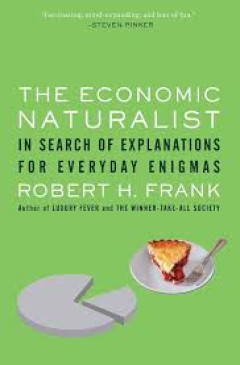Ditapis dengan
Ditemukan 3 dari pencarian Anda melalui kata kunci: author="Robert H. Frank"

Microeconomics and behavior
Microeconomics and Behavior freely concedes the importance of the self-interest motive in many contexts. But it also devotes an entire chapter to the role of unselfish motives in social and economics transactions. Employing elementary game theory, this chapter identifies circumstances in which people who hold such motives have a competitive advantage over pure opportunists. It shows, for axampl…
- Edisi
- Ed. 6
- ISBN/ISSN
- 0-07-111549-8
- Deskripsi Fisik
- xxvii, 692 hal. : il. ; 25 cm
- Judul Seri
- -
- No. Panggil
- 338.5 FRA m

The Economic Naturalist
- Edisi
- -
- ISBN/ISSN
- 978-0-465-00217-7
- Deskripsi Fisik
- xiii, ; 226 hal. : 24 cm.
- Judul Seri
- -
- No. Panggil
- -
- Edisi
- -
- ISBN/ISSN
- 978-0-465-00217-7
- Deskripsi Fisik
- xiii, ; 226 hal. : 24 cm.
- Judul Seri
- -
- No. Panggil
- -

Principles of Economics
As you begin the study of economics, perhaps the most important thing to realize is that economics is not a collectionof settled facts, to be copied down and memorized. The principal objective of this book, and of this course, is to help you learn these principles and how apply them to a variety of economic questions and issues.
- Edisi
- third edition
- ISBN/ISSN
- 978-0-07-110604-7
- Deskripsi Fisik
- xxxix, 901 hlm. : il. 27 cm.
- Judul Seri
- -
- No. Panggil
- -
 Karya Umum
Karya Umum  Filsafat
Filsafat  Agama
Agama  Ilmu-ilmu Sosial
Ilmu-ilmu Sosial  Bahasa
Bahasa  Ilmu-ilmu Murni
Ilmu-ilmu Murni  Ilmu-ilmu Terapan
Ilmu-ilmu Terapan  Kesenian, Hiburan, dan Olahraga
Kesenian, Hiburan, dan Olahraga  Kesusastraan
Kesusastraan  Geografi dan Sejarah
Geografi dan Sejarah